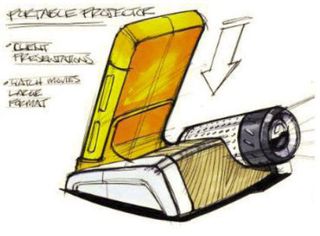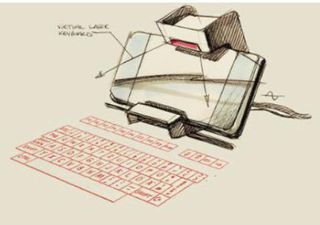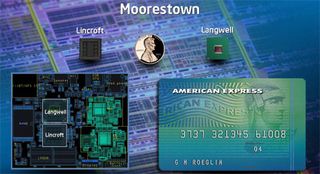Tom's Talks Moorestown With The Father Of Centrino
With its new Atom platform, Moorestown, Intel has made a lot of exciting claims and hinted at significant changes in our computing future. All good stuff, but we need more answers. To find them, we sat down with Intel’s godfather of ultra-mobility.
On Connectivity And Security
TH: You’ve got “PC-like” capability, but not necessarily PC-like connectivity.
TT: In transitioning from a PC to a handheld device, we don’t need to use some of the PC I/Os. We kind of got rid of PCI Express and put in handheld I/Os that are more pertinent to what we need. Things such as MIPI I/Os. MIPI is the handheld I/O organization. To give you an idea, the difference between LVDS and the MIPI interface, just the interface link power is about a 125 mW difference. All these kinds of things allowed us to get to lower power.

TH: I’ve got to believe there’s a need for the platform to accommodate conventional peripherals, like if I wanted to add external storage. How does that get handled from within the device?
TT: For internal storage today, we have basically two channels at 80 MB/s. That’s pretty fast if you consider that smaller laptop drives are at 50 MB/s, so the performance you’re going to get is pretty good here. Now, if you want to add storage later on as you try to turn the phone into a full fledged computer, then you would do it through USB. That’s the key expansion port that we have. We also have SD cards that you could add, both microSD and normal SD.

TH: Is the USB functionality 2.0 or 3.0 already?
TT: No, this will be all 2.0, but it’s kind of “2.0+.” In PCs today, you don’t have link power management on USB. With this generation, we’ve added link power management capability, so it’s added capability. This also supports USB on the Go, so it handles both the client and host controller capabilities.
TH: Process shrink aside, how did Intel get such a significant reduction in dimensions on the motherboard?
Stay on the Cutting Edge
Join the experts who read Tom's Hardware for the inside track on enthusiast PC tech news — and have for over 25 years. We'll send breaking news and in-depth reviews of CPUs, GPUs, AI, maker hardware and more straight to your inbox.
TT: We shrunk the platform to half of its former size by taking a number of jellybean components that are usually on the platform and integrating many of them into Langwell, our I/O hub. Some we integrated into the mixed signal IC, including the battery charger, power delivery, voltage regulators, and the audio. This also allows us to switch on and off those rails very fast and ramp up power very fast through that mixed signal processor, Briertown. It allows us to switch the device on and off much faster than would have been possible otherwise.

TH: Does Moorestown support AES New Instructions?
TT: We have a completely separate security accelerator. Think about this thing. You cannot have a checker check itself. For example, when you’re booting up, the security engine goes and verifies the firmware and makes sure the signature on that firmware is okay, while the main engine is still sitting there not ready to go. Only once the security system sort of blesses it can the rest of the system boot. The other thing is that if you want to do like a cryptographic operation away from software being able to touch it, we can do it in this engine without anybody being able to touch and figure out what’s going on inside of it. It’s a separate engine, not part of the Intel architecture. Now, if you’re talking about some of the instructions we are adding on our bigger cores, yes, they will be added, but that will be from a compatibility perspective.
Current page: On Connectivity And Security
Prev Page Ticky On Power Next Page Creating Versus Consuming-
whitecrowro "Why are we all here today? What is the meaning of Moorestown?Reply
Ticky Thakkar: Our vision was to.."
- pardon me, but all this naming sound like a Star Trek interview, on Tau Cygna (M class planet in Orion Nebula). -
cmcghee358 It would be nice to see Intel take a jab at discrete desktop graphics. If anything just to provide more competition for the consumer.Reply -
liquidsnake718 It would be nice to see that Zune HD ver 2.0 or even 3.0 with an updated Moorestown and a better Nvidia chip than the ion or ion2, with capabilities of at least 2.0ghz and 2gb of ram all the size of the zune.... imagine with 48hours on music, and 5 hours of video, this will only get larger as time goes by.... hopefully in a year or a year and a half we can see some TRUE iphone competition now with the new windows mobile out! We just need more appsReply -
Onus It never occurred to me to want an iPhone, but I definitely see one of these in my future.Reply -
matt314 cmcghee358It would be nice to see Intel take a jab at discrete desktop graphics. If anything just to provide more competition for the consumer....discrete desktop graphics is a pretty niche market. Without any experience in the field or specialized engineers, it would cost them alot of money in R&D, and they would not be able to beat ATI or nVidia (neither in performance nor sales)Reply -
cknobman Maybe its just me but I read the entire thing and Mr. Shreekant (Ticky) Thakkar came off as a arrogant ********.Reply -
Onus cknobmanMaybe its just me but I read the entire thing and Mr. Shreekant (Ticky) Thakkar came off as a arrogant dickhead.Merely disagreeing with you doesn't merit a "thumbs-down," but I didn't get that impression. Confidence, maybe; his experience no doubt backs that up, but I didn't find him arrogant. I liked how he called BS on the FUD.Reply
-
zodiacfml I read his comments carefully and found that those were carefully chosen words. Confidence is very much needed to get the support everyone while remaining factual.Reply
In summary, I expect their device to be better performing than anything else in the future at the expense of a huge and heavy battery to power the Atom and the Huge screen making use of excess performance.
cknobmanMaybe its just me but I read the entire thing and Mr. Shreekant (Ticky) Thakkar came off as a arrogant dickhead. -
cjl zodiacfmlI read his comments carefully and found that those were carefully chosen words. Confidence is very much needed to get the support everyone while remaining factual.In summary, I expect their device to be better performing than anything else in the future at the expense of a huge and heavy battery to power the Atom and the Huge screen making use of excess performance.Did you read the article? One of the points raised was that the battery life should be just fine, contrary to many people's assumptions.Reply -
eyemaster He knows his product, the targets to meet and what they have accomplished. I'm sure they experimented on competing devices too. The man knows that they have a great product in their hands right now that beats all the others. That makes him confident, not arrogant.Reply
Most Popular

